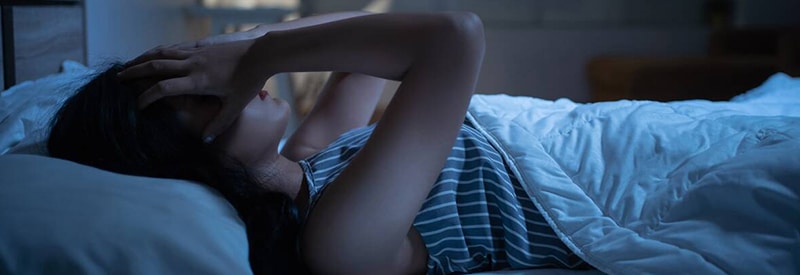
Sleep disorder clinic in Tyler, TX
At UT Health North Campus Tyler’s Center for Sleep Disorders, we are dedicated to diagnosing and treating various sleep disorders. Our sleep study services address a wide range of issues, from common conditions like sleep apnea and nightmares to insomnia, narcolepsy, and restless leg syndrome. We also offer pediatric sleep care for children with sleep problems or disorders. From initial consultation to in-depth sleep studies, our goal is to identify and address the root causes of sleep disturbances, providing relief and improving your overall health and well-being.
Sleep disorders we treat
Sleep can be divided into two types: (REM) sleep and non-REM (NREM) sleep. NREM sleep has four stages of increasingly deep sleep. Stage 1 sleep is the lightest, while stage 4 is the deepest. During normal sleep, you cycle through these types and stages of sleep. But if your sleep is repeatedly interrupted and you cannot cycle normally through REM and NREM sleep, you may feel tired, fatigued, and have trouble concentrating and paying attention while awake. Sleepiness puts you at greater risk for driving and other accidents.
Our sleep disorder clinic provide treatments for the following conditions and sleep disorders:
- Circadian rhythm disorders: Circadian rhythm disorders include jet lag, adjustments to shift work, delayed sleep phase syndrome (you fall asleep and wake up too late) and advanced sleep phase syndrome (you fall asleep and wake up too early).
- Insomnia: People who have insomnia don’t feel as if they get enough sleep at night. They may have trouble falling asleep or may wake up frequently during the night or early in the morning. Insomnia is a problem if it affects your daytime activities. Insomnia has many possible causes, including stress, anxiety, depression, poor sleep habits, circadian rhythm disorders and taking certain medications.
- Narcolepsy: Narcolepsy is a brain disorder that causes excessive daytime sleepiness. There is sometimes a genetic component, but most patients have no family history of the problem.
- Night terrors: Night terrors are frightening dreams that arise during REM sleep. They can be caused by stress, anxiety and some drugs.
- Nocturia: This sleep disorder is characterized by the frequent need to urinate at night. Our sleep specialists may connect you with a urologist for further treatment.
- Pediatric sleep disorders: Children can experience various sleep disorders, from nocturnal enuresis (bed-wetting) to nightmares and more. Our pediatric sleep doctors offer compassionate treatments for your child, so they can get a good night’s sleep.
- Restless leg syndrome: In people who have restless legs syndrome, discomfort in the legs and feet peaks during the evening and night. This can delay sleep onset and cause brief awakening during sleep
- Sleep apnea: One of the most serious sleep disorders is sleep apnea where you literally stop breathing during sleep. This may happen hundreds of times a night, causing you to awaken slightly to resume breathing. Sleep apnea may lead to high blood pressure, cardiovascular disease, weight problems or other health problems.
Symptoms of sleep disorders include excessive snoring, waking up with a headache or not feeling refreshed, daytime sleepiness, sudden body movements during sleep, weight gain, and suddenly waking up gasping for breath. If you are experiencing any of these symptoms, it may be time to schedule a consultation with a sleep specialist.
Sleep apnea treatment
Sleep apnea is treated with lifestyle changes, mouthpieces, breathing devices and surgery. The goal is to help you restore regular breathing during sleeping and relieve your snoring and/or daytime sleepiness. If you have mild sleep apnea, some changes in daily activities or habits might be all the treatment you need.
- Avoid alcohol and medicines that make you sleepy
- If you smoke, quit
- Keep your nasal passages open at night with nasal sprays or allergy medicines, if needed
- Lose weight if you’re overweight or obese
- Sleep on your side instead of your back to help keep your throat open
For more severe cases of sleep apnea, additional treatments may be necessary beyond lifestyle modifications. These include the use of mouthpieces or oral appliances designed to keep the throat open by bringing the jaw forward, which can sometimes relieve snoring and mild obstructive sleep apnea.
One common treatment uses breathing devices, such as Continuous Positive Airway Pressure (CPAP) machines. These machines deliver air pressure through a mask while you sleep to keep your airway open.
In other instances, surgery may be considered, especially if there’s a physical blockage in the nose or throat contributing to sleep apnea. Surgical options can range from tissue removal or shrinkage, jaw repositioning, implants, nerve stimulation, to more complex procedures.
These treatments aim to enhance sleep quality and reduce the health risks associated with sleep apnea, such as heart problems and daytime fatigue.
About our sleep studies
At UT Health North Campus Tyler’s Sleep Medicine Clinic, patients undergo thorough evaluations to diagnose and understand their sleep/wake disturbances. During an overnight sleep study, essential parameters like brain waves, heart rate, snoring, respiration, leg muscle activity, and oxygen saturation levels are closely monitored. This process involves noninvasive recording techniques, with all electrodes painlessly applied to the skin. Patients spend the night in a comfortable bed at the UT Health East Texas Sleep Disorders Center, where their sleep is observed and recorded.
For those whose sleep/wake disorders impact daytime functioning, an additional evaluation of daytime sleepiness is conducted. This involves staying at the center during the day and attempting to sleep at two-hour intervals over a series of four naps, with breakfast and lunch provided.
Following the completion of the sleep study, your physician will review the findings and discuss treatment options to enhance your sleep quality, ensuring you can enjoy a more peaceful and restful night.

